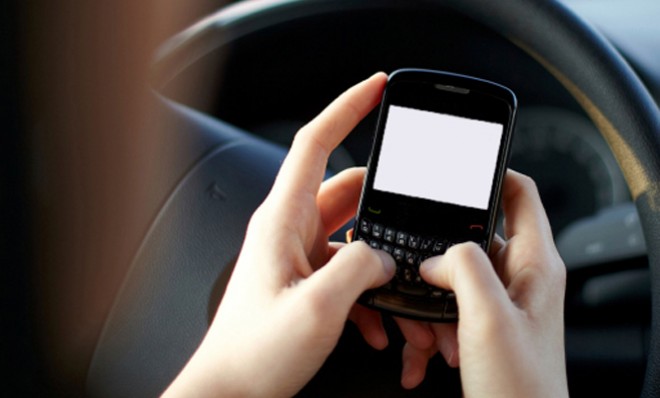Should your car disable your smartphone to prevent texting while driving?
According to one survey, 49 percent of adults admit to texting while driving... even though 98 percent know it's unsafe


A free daily email with the biggest news stories of the day – and the best features from TheWeek.com
You are now subscribed
Your newsletter sign-up was successful
"Uncle Sam wants automakers to make it impossible for you to text your wife, check Facebook, and watch a video while you're driving," says Damon Lavrinc at Wired. In late 2011, the federal Transportation Department suggested that all 50 states ban texting and other use of your cell phone while driving. (Forty states now have texting-while-driving bans.) And on Tuesday, the National Highway Traffic Safety Administration (NHTSA) issued new guidelines urging carmakers to disable most visual-manual activities while the car is in gear.
"Distracted driving is a deadly epidemic that has devastating consequences on our nation's roadways," said Transportation Secretary Ray LaHood, who has made fighting texting-while-driving one of his personal crusades. According to NHTSA figures, distracted driving was instrumental in 10 percent of all traffic deaths in 2011 — 3,331 killed, up from 3,092 in 2010 — and a new NHTSA study indicates that texting, dialing, and other smartphone and portable-device use increases the risk of getting into a crash by up to three times.
Specifically, the Transportation Department would like automakers to disable three types of activities:
The Week
Escape your echo chamber. Get the facts behind the news, plus analysis from multiple perspectives.

Sign up for The Week's Free Newsletters
From our morning news briefing to a weekly Good News Newsletter, get the best of The Week delivered directly to your inbox.
From our morning news briefing to a weekly Good News Newsletter, get the best of The Week delivered directly to your inbox.
* Manual text entry for the purposes of text messaging and internet browsing
* Video-based entertainment and communications like video phoning or video conferencing
* Display of certain types of text, including text messages, web pages, and social media content
Right now, the recommendations are only for devices that automakers install in their cars, and "most of the recommendations are common sense, like limiting text input and what can be displayed on screens or the windshield," says Wired's Lavrinc. "But this is only the first part in a trilogy of recommendations to limit in-car distractions," and the other two parts will deal with smartphones. "Here's where Samsung, HTC, and Apple have something to worry about."
A free daily email with the biggest news stories of the day – and the best features from TheWeek.com
A new study from the Texas Transportation Institute found that using voice-activated texting apps (think Siri on the iPhone) while driving is just as dangerous as texting by hand. And a recent essay in the Journal of the American Medical Association, by two West Virginia University physicians, suggests a solution that the NHTSA is sure to consider: "The federal government should enact stringent new safety standards that require all handheld devices to be rendered inoperable when the motor vehicle is in motion."
Legislation, stepped-up penalties and enforcement, and education will all help cut down on distracted driving, argue Dr. Jeffrey Coben and Dr. Motao Zhu, but that isn't enough. In a survey they conducted, 40 percent of drivers admitted they use their cell phone while driving, and 15 percent cop to texting behind the wheel. A recent survey from AT&T backs that up: 49 percent of adults (and 43 percent of teens) admit to texting while driving, even though 98 percent know it's unsafe, the practice seems to be growing — 60 percent of adults say they didn't text-and-drive three years ago.
The technology is out there to jam your smartphone while behind the wheel — a company called Scosche is already selling such a device — and LaHood suggested in 2010 that "the government was examining cell phone jammers and scramblers as a possible solution to distracted driving," says Amar Toor at The Verge, "though a Department of Transportation spokesperson later downplayed LaHood's statements."
Carmakers are on-board, arguing that smartphones are more dangerous than built-in devices and that it's unfair to just target navigation, communication, and entertainment add-ons that come in your new vehicle. But before anyone starts mourning their turn-by-turn directions from Siri, it's worth remembering that the NHTSA guidelines are just that — non-binding suggestions, says Jeff Blagdon at The Verge. "And since car infotainment systems are often designed years in advance, it will be some time before we see automakers voluntarily adding the functionality, if ever."
Now, maybe LaHood or his successor can focus on getting drivers to stop driving with their dogs on their lap.
Peter has worked as a news and culture writer and editor at The Week since the site's launch in 2008. He covers politics, world affairs, religion and cultural currents. His journalism career began as a copy editor at a financial newswire and has included editorial positions at The New York Times Magazine, Facts on File, and Oregon State University.
-
 The environmental cost of GLP-1s
The environmental cost of GLP-1sThe explainer Producing the drugs is a dirty process
-
 Greenland’s capital becomes ground zero for the country’s diplomatic straits
Greenland’s capital becomes ground zero for the country’s diplomatic straitsIN THE SPOTLIGHT A flurry of new consular activity in Nuuk shows how important Greenland has become to Europeans’ anxiety about American imperialism
-
 ‘This is something that happens all too often’
‘This is something that happens all too often’Instant Opinion Opinion, comment and editorials of the day
